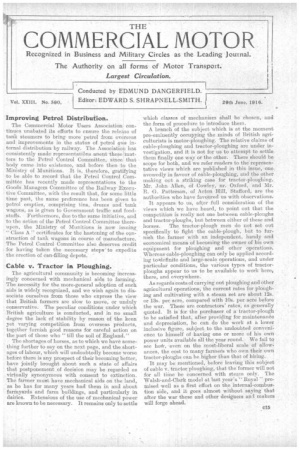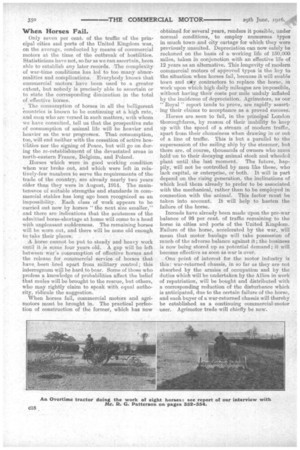Improving Petrol Distribution,
Page 1

Page 2

If you've noticed an error in this article please click here to report it so we can fix it.
The Commercial Motor Users Association. continues unabated its efforts to ensure the release of tank steamers to bring more petrol from overseas and improvements in the status of patrol qu:a internal distribution by railway.. The Association has consistently made repre.sentati6ns anent theselmatters to the Petrol Control Committee, since that body came into existence, and before then to the Ministry of Munitions. It is, therefore, gratifying to be able to record that the Petrol Control Committee has recently made representations . to the Goods Managers Committee of the Railway Executive. Committee, with the restilt that, for some little time past, the same preference has been given to petrol empties, comprising tins, drums and tank wagons, as is given to Government traffic and foodstuffs. Furthermore, due to the same initiative, and to the action of the Petrol Control Committee thereupon, the Ministry of Munitions is now issuing. Class A'' certificates for the hastening of the construction of tank wagons in course of manufacture. The Petrol Control Committee also deserves credit for having taken the necessary steps to expedite the erection of can-filling depots.
Cable v. Tractor in Ploughing.
The agricultural community is becoming increasingly concerned with mechanical aids to farming. The necessity for the more-general adoption of such aids is widely recognized, and We wish again to dissociate ourselves from those who express the view, that British farmers are slow to move; or unduly conservative: The peculiar conditions under which British agriculture is conducted, and in no small degree the lack of stability by reason of the keen yet varying competition from overseas products, together furnish good reasons for careful action on the part of those who " till the soil of England."
The shortages of horses, as to which we have something further to say on the next page, and the shortages of labour, which will undoubtedly become worse beidre there is any prospect of their becoming better, have jointly brought about sueh a state of affairs that postponement of decision may be regarded as virtually synonymous with consent to extinction. The farmer must have ,mechanical aids on the land, as he has for many years had them in and about farinyards and farm buildings, and particularly in. dairies. Extensions of the use of mechanical power are known to be necessary. It remains only to settle which classes of mechanism shall be chosen, and the form of procedure to introduce them.
A branch of the subject which is at the moment pre-eminently occupying the minds of British agriculturists is motor-ploughing. The relative claims of cable-ploughing and tractor:ploughing are under investigation, and it is not for us to attempt to settle. them finally one way or the other. There should be scope for both, and we refer readers to the representative views which are published in this issue,one avowedly in favour of cable-ploughing, and the other making out a striking case for tractor-ploughing. Mr. JohnAllen, of -Cowley, nr. Oxford, and Mr. R. •G. Patterson, of Acton Hill, Stafford, are the authorities who have favoured us with observations.
It appears to us, after full consideration of the views which we have heard, to point out that the competition is really not one between cable-ploughs and tractor-ploughs, but between either of these and horses. The tractor-plough men do not set out specifically to fight the cable7plough, but to furnish the farmer with an independent, handy and economical means Of becoming the owner of his own equipment for ploughing and other operations. Whereas cable-ploughing can only be applied according toidefmite and large-scale operations, and under particular conditions, the varibus types of tractorploughs appear to us to be available. to work here, there, and everywhere.
As regards costs of carrying out ploughing and other agricultural operations, the current rates for ploughing and cultivating with a steam set are about 12s. or 13s. per acre, compared with 10s, per acre before the war. These are, contractors' rates, as 'generally quoted. It is for the purchaser of a tractor-plough to be satisfied' that, after providing for maintenanee and depreciation, he can do the workat a. lower inclusive figure, subject to the undoubted convenience to himself of having One or more of his own power units available all the year round. We fail to see ho*, even on the most-liberal scale of allowances, the cost to many farmers who own their own tractor-ploughs can. be higher than that of hiring.
It may be mentioned, before leaving this subject of cable v. tractor ploughing,-that the: former will not fOr all time be concerned with steam only. The Walsh-and-Clark model at last year's " Royal " pronaised well as a first effort on the internal-combustion side, and it goes almost without saying that after the war these and other designers and makers will forge ahead.
When Horses Fail.
Only seven per cent, of the traffic of the principal cities and ports of the United Kingdom was, on the average, conducted by means of commercial motors at the time of the outbreak of hostilities. Statisticians have not, so far as we ean ascertain, been able to establish any later recOrds. The complexity of war-time conditions has led to too many abnormalities and complications. Everybody knows that commercial motors have been used to a greater extent, but nobody is precisely able to ascertain or to state the corresponding diminution in the total of effective horses.
The consumption of horses in all the belligerent countries is known to be continuing at a high rate, and men who are versed in such matters, with whom we have consulted, tell Us that the prospective rate of consumption of animal life will be heavier and heavier as the war progresses. That consumption, top, will end neither with the cessation of active hostilities nor the signing of Peace, but will go on during the re-establishment of the devastated areas in north-eastern France, Belgium, and Poland.
. Horses which were in good working condition when war broke out, and which were left in relatively-few numbers to serve the requirements of the trade of the country; are already nearly two years older than they were in August, 1914. The Maintenance ef snitable strengths and standards in commercial stables has long ago been recognized as an impossibility. Each class of work appears to be carried out now by horses "the next size smaller," and there are indications that the acuteness of the admitted horse.-shortage at home will come to a head with unpleasant suddenness. The remaining horses will be worn out, and there will be none old enough to take their places..
horse. cannot be put to steady and heavy work until it ;is some four years old. A gap will be left between war's consumption of effective horses and the release. for commercial service -of horses that have...been .bred apart from military control ; this interregnum will be hard to bear. Some of those who profess a knowledge of probabilities affect the belief that mules will be brought to the rescue, but others, who may rightly claim to speak with equal authority, ridicule the suggestion.
When horses fail, commercial motors and agrimotors must be brought in. The practical perfection of construction of the former, which has now obtained for several years, renders it possible, under normal conditions,. to employ numerous types in much town and city cartage for which they were previously unsuited. Depreciation can now safely be reckoned on the basis of a working life of 150,000 miles, taken in conjunction with an effective life of 12 years as an alternative. This longevity of modern commercial motors of approved typeS is the key to the situation when horses fail, because it will enable town and city contractors to replace the horse, in work upon which high daily mileages are impossible, without having their dosts per mile unduly inflated by the incidence of depreciation. Agrimotors, as our " Royal " report tends to prove, are rapidly asserting their claims to acceptance as a proved success.
Horses are. seen to fail, in the principal London thoroughfares, by reason of their inability to keep up with the speed of a stream of modern traffic, apart from their clumsiness when drawing in or out of a. line of traffic. This is but a parallel to the supersession of the sailing ship by the steamer, but there are, of course, thousands of owners who must hold on to their decaying animal stock and wheeled. plant until the last moment. The future, happily, will not be controlled by men like these, who lack capital, or enterprise, or both. It will in part depend on the rising generation, the inclinations of which lead them already to prefer to be associated with the mechanical, rather than to be employed in connection with the animal. This factor must be taken into account. It will help to hasten the failure of the horse.
Inroads have already been made upon the pre-war balance of 93 per cent, of traffic remaining to the horse in cities and ports of the United Kingdom. Failure of the horse, accelerated by the war, will mean that motor haulage' will take possession of much of the adverse balance against it ; the business is now being stored up as potential demand; it will become effective as soon as war is over.
One point of interest for the motor industry is this: war-returned chassis, in so far as they are not absorbed by the armies of occupation and by the duties which will be undertaken by the Allies in work of repatriation, will be bought and distributed with a 'corresponding reduction of the disturbance which is anticipated, due to the certain failure of the horse, and each buyer of a war-returned chassis will thereby be established as a continuing commercial-motor user. Agrimotor trade will chiefly be new.






























